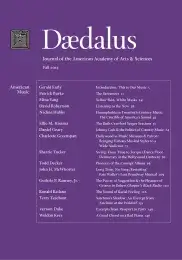The Ruth Crawford Seeger Sessions
Ruth Crawford Seeger (1901–1953), an American experimental composer active in the 1920s and 1930s, devoted the second half of her career to transcribing, arranging, performing, teaching, and writing about American folk music. Many works from Crawford Seeger’s collections for children, including “Nineteen American Folk Songs” and “American Folk Songs for Children,” are widely sung and recorded, but her monumental efforts to publish them often remain unacknowledged. This article underscores the link between her work in American traditional music and Bruce Springsteen’s best-selling 2006 album “We Shall Overcome: The Seeger Sessions” in order to give Crawford Seeger due credit for her contributions. By examining her prose writings and song settings, this article illuminates aspects of her thinking about American traditional music and elements of her unusual and striking arrangements, which were deeply informed by her modernist ear.
Of his 2006 album We Shall Overcome: The Seeger Sessions, Bruce Springsteen remarked: “Growing up as a rock ’n’ roll kid, I didn’t know a lot about Pete’s music or the depth of his influence. So I headed to the record store and came back with an armful of Pete Seeger records. Over the next few days of listening, the wealth of songs, their richness and power changed what I thought I knew about ‘folk music.’ Hearing this music and our initial ’97 session for Pete’s record sent me off, casually at first, on a quest.”1
A tribute to a key figure in the folk revival, Springsteen’s recording stirs up discussion about the complex processes of transmission and influence in American traditional music. His rendition on We Shall Overcome of several traditional American tunes, such as “Froggie Went a-Courtin’,” “John Henry,” “Erie Canal,” “Buffalo Gals,” and “Old Dan Tucker,” can be traced back five decades to Pete Seeger, who first recorded them in the 1950s.2 The renewed interest in Pete Seeger spurred by Springsteen’s Grammy-winning, best-selling album and his international Seeger Sessions tours has unfortunately not extended to another Seeger . . .
